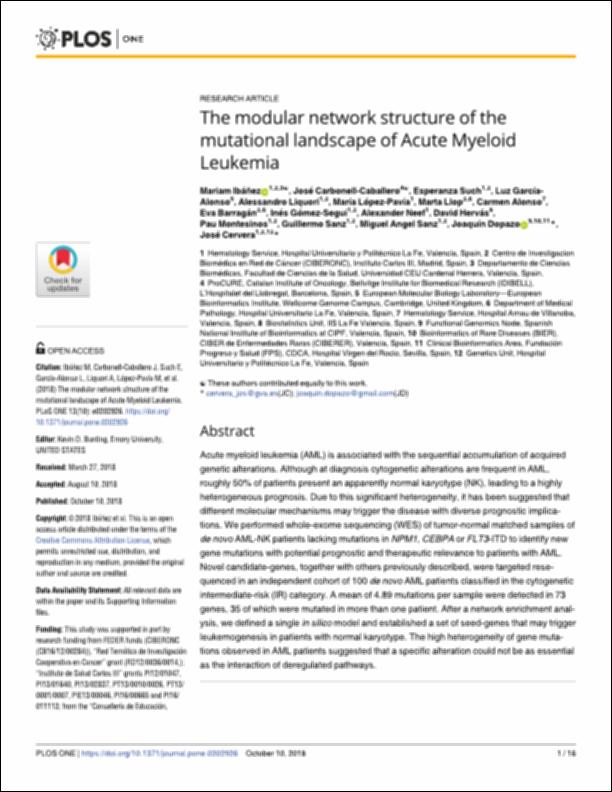Please use this identifier to cite or link to this item:
http://hdl.handle.net/10637/10222The modular network structure of the mutational landscape of Acute Myeloid Leukemia
| Title: | The modular network structure of the mutational landscape of Acute Myeloid Leukemia |
| Authors : | Ibáñez Company, Mariam Carbonell Caballero, José Such Taboada, Esperanza García Alonso, Luz Liquori, Alessandro López Pavía, María |
| Keywords: | Mutación (Biología); Acute leukemia.; Leucemia aguda.; Mutation (Biology); Citogenética.; Cytogenetics. |
| Publisher: | PLOS |
| Citation: | Ibáñez, M., Carbonell Caballero, J., Such, E., García Alonso, L., Liquori, A., López Pavía, M. et al. (2018). The modular network structure of the mutational landscape of Acute Myeloid Leukemia. PLoS ONE, vol. 13, n. 10 (october), art. e0202926. DOI: https://doi.org/10.1371/journal.pone.0202926 |
| Abstract: | Acute myeloid leukemia (AML) is associated with the sequential accumulation of acquired genetic alterations. Although at diagnosis cytogenetic alterations are frequent in AML, roughly 50% of patients present an apparently normal karyotype (NK), leading to a highly heterogeneous prognosis. Due to this significant heterogeneity, it has been suggested that different molecular mechanisms may trigger the disease with diverse prognostic implications. We performed whole-exome sequencing (WES) of tumor-normal matched samples of de novo AML-NK patients lacking mutations in NPM1, CEBPA or FLT3-ITD to identify new gene mutations with potential prognostic and therapeutic relevance to patients with AML. Novel candidate-genes, together with others previously described, were targeted resequenced in an independent cohort of 100 de novo AML patients classified in the cytogenetic intermediate-risk (IR) category. A mean of 4.89 mutations per sample were detected in 73 genes, 35 of which were mutated in more than one patient. After a network enrichment analysis, we defined a single in silico model and established a set of seed-genes that may trigger leukemogenesis in patients with normal karyotype. The high heterogeneity of gene mutations observed in AML patients suggested that a specific alteration could not be as essential as the interaction of deregulated pathways. |
| Description: | En PLoS ONE. San Francisco (California, United States) : PLOS. Vol. 13 (october 2018), n. 10, art. e0202926. Este artículo se encuentra disponible en la página web de la revista en la siguiente URL: https://journals.plos.org/plosone/article?id=10.1371/journal.pone.0202926 También participan en la elaboración de este artículo científico: José Carbonell-Caballero , Esperanza Such, Luz García-Alonso, Alessandro Liquori, María López-Pavía, Marta Llop, Carmen Alonso, Eva Barragán, Inés Gómez-Seguí, Alexander Neef, David Hervás, Pau Montesinos, Guillermo Sanz, Miguel Angel Sanz, Joaquín Dopazo y José Cervera. |
| URI: | http://hdl.handle.net/10637/10222 |
| Rights : | http://creativecommons.org/licenses/by/4.0/deed.es |
| ISSN: | 1932-6203. |
| Issue Date: | 1-Oct-2018 |
| Center : | Universidad Cardenal Herrera-CEU |
| Appears in Collections: | Dpto. Farmacia |
Items in DSpace are protected by copyright, with all rights reserved, unless otherwise indicated.


